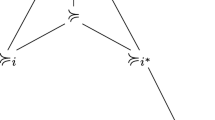Abstract
Power measures are used to quantify the influence of members of a democratic institution. We consider voting games with abstention or (3,2) games, which are decision-making processes in which voting options include yes, no and abstention. The power indices that we study are based on the notions of minimal and shift minimal winning tripartitions. We define and characterize the Deegan–Packel and shift Deegan–Packel power indices in the class of (3,2) games. Furthermore, owing to the parameterization result obtained by Freixas et al. (Discret Appl Math 255:21–39, 2019), we provide computational formulae of these indices in the class of I-complete (3,2) games. These formulae allow us to determine the power of each player in a game, regardless of the number of minimal and/or shift minimal winning tripartitions of the game.
Similar content being viewed by others
Data availability
Not applicable.
References
Alonso Meijide J, Freixas J (2010) A new power index based on minimal winning coalitions without any surplus. Decis Support Syst 49:70–76
Andjiga N, Chantreuil F, Lepelley D (2003) La mesure du pouvoir de vote. Mathématiques et Sciences Humaines 163:111–145
Banzhaf JF (1965) Weighted voting doesn’t work: a mathematical analysis. Rutgers Law Rev 19:317–343
Coleman J (1971) Control of collectivities and the power of a collectivity to act. In: Lieberman B (ed) Social choice. Gordon and Breach, New York, pp 269–300
Courtin S, Tchantcho B (2015) A note on the ordinal equivalence of power indices in games with coalitional structure. Theory Decis 78(4):617–620
Courtin S, Tchantcho B (2019) Public good indices for games with several level of approval. BE J Theor Econ Top Theor Econ (in press). https://doi.org/10.1515/bejte-2019-0068. halshs-02319527
Deegan J, Packel EW (1978) A new index of power for simple \(n\)-person games. Int J Game Theory 7:113–123
Felsenthal DS, Machover M (1997) Ternary voting games. Int J Game Theory 26:335–351
Freixas J (2005) The Shapley–Shubik power index for games with several levels of approval in the input and the output. Decis Support Syst 39:185–195
Freixas J (2012) Probabilistic power indices for voting rules with abstention. Math Soc Sci 64:89–99
Freixas J, Kurz S (2015) The cost of getting local monotonicity. Eur J Oper Res 251:600–612
Freixas J, Zwicker WS (2003) Weighted voting, abstention and multiple levels of approval. Soc Choice Welf 21:399–431
Freixas J, Marciniak D, Pons M (2012) On the ordinal equivalence of the Johnston, Banzhaf and Shapley power indices. Eur J Oper Res 216:367–375
Freixas J, Tchantcho B, Tedjeugang N (2014a) Voting games with abstention: linking completeness and weightedness. Decis Support Syst 57:172–177
Freixas J, Tchantcho B, Tedjeugang N (2014b) Achievable hierarchies in voting games with abstention. Eur J Oper Res 236:254–260
Freixas J, Tchantcho B, Tsague B (2019) A parameterization of a class of voting games with abstention. Discret Appl Math 255:21–39
Hamiache G (1999) A new axiomatization of the Owen value for games with coalition structures. Math Soc Sci 37:281–305
Holler MJ, Packel EW (1983) Power, luck, and the right index. J Econ 43:21–29
Johnston RJ (1978) On the measurement of power: some reactions to Laver. Environ Plan A 10:907–914
Kenfack J, Tchantcho B, Tsague B (2019) On the ordinal equivalence of Shapley–Shubik, Banzhaf and Johnston power indices for voting games with abstention. Int J Game Theory 48:247–271
Laruelle A, Valenciano F (2008) Voting and collective decision-making. Cambridge University Press, Cambridge
Laruelle A, Valenciano F (2012) Quaternary dichotomous voting rules. Soc Choice Welf 38:431–454
Lorenzo-Freire S, Alonso-Meijide JM, Casas-Méndez B, Friestras-Janeiro MG (2007) Characterizations of the Deegan–Packel and Johnston power indices. Eur J Oper Res 177:431–444
Owen G (1977) Values of games with a priori unions. In: Hein R, Moeschlin O (eds) Essays in mathematical economics and game theory. Springer, New York, pp 76–88
Owen G (1981) Modification of the Banzhaf-Coleman index for games with a priori unions. In: Holler MJ (ed) Power, voting and voting power. Physica, Heidelberg. https://doi.org/10.1007/978-3-662-00411-1_17
Parker C (2012) The influence relation for ternary voting games. Eur J Oper Res 75:867–881
Rubinstein A (1980) Stability of decision systems under majority rule. J Econ Theory 23:150–159
Shapley LS, Shubik M (1954) A method for evaluating the distribution of power in a committee system. Am Polit Sci Rev 48:787–792
Author information
Authors and Affiliations
Corresponding author
Additional information
Publisher's Note
Springer Nature remains neutral with regard to jurisdictional claims in published maps and institutional affiliations.
Rights and permissions
Springer Nature or its licensor (e.g. a society or other partner) holds exclusive rights to this article under a publishing agreement with the author(s) or other rightsholder(s); author self-archiving of the accepted manuscript version of this article is solely governed by the terms of such publishing agreement and applicable law.
About this article
Cite this article
Siani, J., Tchantcho, B. & Tsague, B.P. Axiomatization of some power indices in voting games with abstention. Soc Choice Welf (2024). https://doi.org/10.1007/s00355-024-01517-2
Received:
Accepted:
Published:
DOI: https://doi.org/10.1007/s00355-024-01517-2



